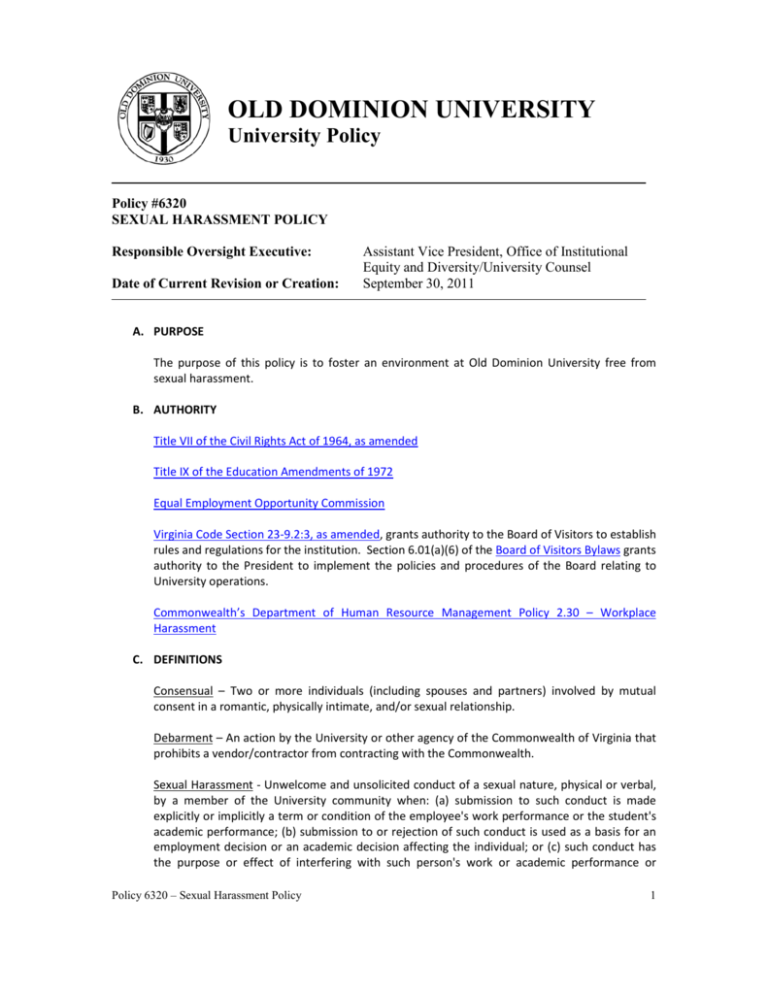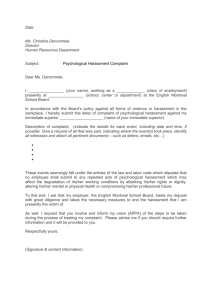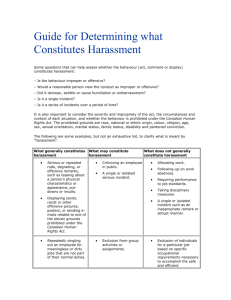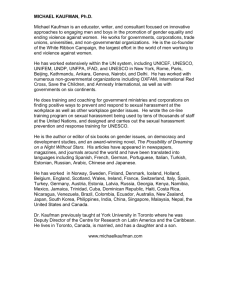
OLD DOMINION UNIVERSITY
University Policy
Policy #6320
SEXUAL HARASSMENT POLICY
Responsible Oversight Executive:
Date of Current Revision or Creation:
Assistant Vice President, Office of Institutional
Equity and Diversity/University Counsel
September 30, 2011
A. PURPOSE
The purpose of this policy is to foster an environment at Old Dominion University free from
sexual harassment.
B. AUTHORITY
Title VII of the Civil Rights Act of 1964, as amended
Title IX of the Education Amendments of 1972
Equal Employment Opportunity Commission
Virginia Code Section 23-9.2:3, as amended, grants authority to the Board of Visitors to establish
rules and regulations for the institution. Section 6.01(a)(6) of the Board of Visitors Bylaws grants
authority to the President to implement the policies and procedures of the Board relating to
University operations.
Commonwealth’s Department of Human Resource Management Policy 2.30 – Workplace
Harassment
C. DEFINITIONS
Consensual – Two or more individuals (including spouses and partners) involved by mutual
consent in a romantic, physically intimate, and/or sexual relationship.
Debarment – An action by the University or other agency of the Commonwealth of Virginia that
prohibits a vendor/contractor from contracting with the Commonwealth.
Sexual Harassment - Unwelcome and unsolicited conduct of a sexual nature, physical or verbal,
by a member of the University community when: (a) submission to such conduct is made
explicitly or implicitly a term or condition of the employee's work performance or the student's
academic performance; (b) submission to or rejection of such conduct is used as a basis for an
employment decision or an academic decision affecting the individual; or (c) such conduct has
the purpose or effect of interfering with such person's work or academic performance or
Policy 6320 – Sexual Harassment Policy
1
participation in extracurricular activities by creating an intimidating, hostile, or offensive
working or educational environment.
A variety of sexual conduct directed at another University community member may be
considered sexual harassment, including, but not limited to:
a. Comments of a sexual nature including sexually explicit statements, questions, jokes or
anecdotes;
b. Remarks of a sexual nature about a person's body or clothing, whistling in a suggestive
manner, obscene gestures;
c. Uninvited physical contact or touching such as pinching or intentional brushing against the
body; and
d. Solicitation of sexual favors through implicit or explicit promises of workplace or academic
rewards or threats of punishment.
Work - Employment-related activities carried out by University employees and Universitysponsored activities carried out by volunteers.
D. SCOPE
This policy applies to all employees, students, volunteers, employees of affiliated organizations,
and visitors to the institution. Employees include all staff, administrators, faculty, full- or parttime, and classified or non-classified persons who are paid by the University. Students include all
persons attending classes whether enrolled or not enrolled. Affiliated organizations are separate
entities that exist for the benefit of the University and include the Foundations, the Community
Development Corporation, and the Alumni Association. Visitors include vendors and their
employees, parents of students, volunteers, guests, uninvited guests and all other persons
located on property, owned, leased, or otherwise controlled by the University.
E. POLICY STATEMENT
It is the policy of Old Dominion University to provide students and employees with an
environment for learning and working that is free of sexual harassment whether by members of
the same sex or the opposite sex. University administrators and supervisors are responsible for
ensuring that effective measures are taken to implement the procedures outlined in this policy.
It is a violation of this policy for any member of the University community to seek gain,
advancement, or consideration in return for sexual favors or to make an intentionally false
accusation of sexual harassment.
F. PROCEDURES
1. The Assistant Vice President for Institutional Equity and Diversity (“Assistant Vice
President”) must be advised of all complaints or reported incidents of sexual harassment.
The Office of Institutional Equity and Diversity will monitor repeated complaints or reports
within the same unit or against the same individual.
2. Responsibilities of Individuals Experiencing Harassment
a. Any individual in the University community who believes she or he has been the victim
of sexual harassment as defined in this policy should contact the Office of Institutional
Equity and Diversity (“OIED”) or a member of the University’s Committee on Sexual
Harassment.
Policy 6320 – Sexual Harassment Policy
2
b.
All student complaints of sexual harassment must be made within two years from the
date the alleged harassment occurred.
c.
Complaints by other members of the University community must be made within 120
days from the date the alleged harassment occurred.
3. Responsibilities of Administrators, Supervisors, and Faculty
a. University administrators, supervisors, faculty members and others who are performing
instructional or academic advising duties are responsible for devising and adopting
appropriate practices for maintaining a working and learning environment free of sexual
harassment.
b. University administrators, supervisors, faculty members and others who are performing
instructional or academic advising duties have an added responsibility of reporting any
claim or concern of sexual harassment to the OIED.
c. University administrators, supervisors, faculty members and others in supervisory
positions have the obligation to be knowledgeable of the policy and respond to
incidents and claims of harassment in their areas of supervisory responsibility. Failure
to perform a supervisory responsibility may result in disciplinary action under the
appropriate policy.
4. The OIED shall summarily dismiss a complaint if it is determined that the complaint fails to
state a claim of sexual harassment or retaliation or if the Sexual Harassment Policy does not
pertain to the claim. This dismissal is final and cannot be appealed.
5. Informal Complaint Procedure
a. The accuser may elect an informal process to mediate the complaint through OIED. This
process provides an opportunity for the accuser and the accused to resolve the problem
in an informal manner, without the necessity of disciplinary action or of the more formal
procedures for processing a complaint.
b. Upon conclusion of the informal review, if the complaint is unresolved and the accuser
desires to proceed with the charge, the record of the complaint shall be provided to the
appropriate administrative designee listed below.
c. Although an accuser may elect the informal process, the OIED may determine that
because of the seriousness of the allegations the informal process is inappropriate and
instead inform the accuser that the formal complaint procedure will be utilized.
6. Formal Complaint Procedure
The accuser may elect to submit a formal complaint of sexual harassment. If the accuser
chooses the formal complaint procedure, he or she should contact the OIED. OIED staff will
advise the accuser of the options for addressing the complaint. The accuser may choose
only one of the available options from the list below.
Policy 6320 – Sexual Harassment Policy
3
ACCUSER
OPTIONS
Student
University's Sexual Harassment Policy's Office of Institutional Equity
Formal Complaint Procedure
and Diversity ("OIED")
Faculty
CONTACT
University's Sexual Harassment Policy's
Formal Complaint Procedure
OIED
Faculty Grievance Procedure
Chair of Faculty Grievance
Committee
Classified Employee
University's Sexual Harassment Policy's
Formal Complaint Procedure
OIED
Commonwealth’s Department of
Human Resource Management’s
Discrimination Complaint Procedures
Human Resources
Virginia Department of Employment
Dispute Resolution’s Grievance
Procedure
Human Resources
Wage Employee
University's Sexual Harassment Policy's
Complaint Procedure
OIED
Commonwealth’s Department of
Human Resource Management’s
Discrimination Complaint Procedures
Human Resources
Administrator,
Alumnus, Visitor or
Volunteer
University's Sexual Harassment Policy's
Formal Complaint Procedure
OIED
If the accuser chooses the University’s Sexual Harassment Formal Complaint Procedure, the
following steps should be taken:
a. The accuser shall submit to the OIED, in writing, a summary of the nature of the
harassment and indicate what remedy is being sought. The Assistant Vice President shall
forward a summary of the charges to the appropriate supervisor/administrator, with a
copy of this policy, and advise him or her that an investigation of charges will be
conducted.
b. The supervisor/administrator is expected to collaborate with the OIED, which will assign
an investigator to conduct a prompt investigation of the complaint. During the
investigation, the individual accused of sexual harassment will be provided an
opportunity to respond, either orally or in writing, to the complaint. Failure to
cooperate with the investigation by the accused may be grounds for disciplinary action.
c. In determining whether the alleged conduct constitutes sexual harassment, the
investigator will review the record as a whole and consider the totality of the
circumstances, such as the nature of the alleged sexual conduct and the context in
which the conduct occurred.
d. Upon the completion of the investigation, the investigator shall submit the findings and
recommendations to the Assistant Vice President.
Policy 6320 – Sexual Harassment Policy
4
e. If the OIED finds that no violation of the Sexual Harassment Policy has occurred, the
Assistant Vice President will notify the parties of the results. The Assistant Vice
President will also notify the appropriate administrator.
f.
If the OIED finds that a violation of the Sexual Harassment Policy has occurred, the
Assistant Vice President will:
i. Notify the parties of the results, to the extent consistent with confidentiality.
ii. Forward a report to the appropriate administrator.
iii. Direct that prompt remedial action be taken to correct the situation.
g. The accuser's right for redress under this policy shall terminate after notification that
the case has been closed.
h. The investigation of a complaint will be concluded as soon as possible after receipt of
the written complaint. If an investigation exceeds 30 days, the accuser, accused
individual, and the administrator will be provided an update on the progress of the
investigation, including a proposed completion date.
i.
Other related issues not specifically identified in the complaint may be brought to the
attention of the appropriate administrator by the Assistant Vice President.
7. Disciplinary Action
a. Any member of the University community who is found in violation of this policy will be
subject to appropriate disciplinary action, which may include discharge, expulsion or
debarment.
b. The imposition of a sanction shall occur in accordance with applicable University
disciplinary and sanction procedures.
The sanctions that may be imposed shall include but are not limited to:
i. For faculty, administrators, and staff - censure/reprimand, demotion, suspension
without pay, or discharge.
ii. For students - probation, suspension, or expulsion.
iii. For other members of the University community - reprimand, temporary or
permanent debarment.
8. Retaliation
Any person who has been accused of sexual harassment, pursuant to the terms of this
policy, who retaliates against his/her accuser in any manner, shall be charged with a
violation of this policy, which shall be treated as an independent and separate act of sexual
harassment.
9. Confidentiality
Old Dominion University will endeavor to maintain confidentiality to the extent permitted
by law. Where the accuser's desire to maintain anonymity may constrain attempts to
establish facts and eliminate the potential harassment, Old Dominion University will
attempt to find the right balance between the accuser's desire for confidentiality with the
Policy 6320 – Sexual Harassment Policy
5
responsibility of Old Dominion University to provide an environment free of sexual
harassment. Old Dominion University may take action beyond that requested by the accuser
consistent with the purpose of this policy.
10. Consensual Relationships
Employees, whether faculty or staff, shall not engage in a consensual relationship with
students when the employee has a “position of authority” with respect to the student in
such matters as teaching or otherwise evaluating, supervising, advising, or coaching a
student as part of a school program or employment situation. Likewise, a supervisor and an
employee shall not engage in a consensual relationship. The University views such
relationships as a conflict of interest. Employees have a duty to comply with the University’s
Conflicts of Interests policy.
A faculty member who enters into a consensual relationship with a student or a supervisor
who enters into a consensual relationship with an employee where a “position of authority”
exists should be aware that, if a charge of sexual harassment is subsequently lodged, it will
be exceedingly difficult to prove a defense on grounds of mutual consent.
If conduct of a sexual nature has occurred or is occurring in an apparently consensual
relationship, and, if a complaint of sexual harassment regarding such conduct is filed by the
student against the faculty member or the graduate assistant, or by the employee against
the University official, then sexual harassment shall be presumed in such cases when:
a. The relationship is between a faculty member or graduate assistant and a student and:
ii. the faculty member or graduate assistant is in a position to determine the student's
grade or otherwise affect the student's academic performance or advancement; and
iii. the relationship began after the faculty member or teaching assistant was in such a
position.
b. The relationship is between an employee and a University official who is in a position to
supervise the employee or otherwise influence the conditions of the employee's work,
and the relationship began after the supervisor was in such a position.
11. Sexual Harassment Committee
The President will appoint a Committee on Sexual Harassment consisting of individuals with
professional training and/or experience that would qualify them to assist victims of sexual
harassment and those accused of violating this policy. The Chair of the committee shall be
the University's Assistant Vice President for Institutional Equity and Diversity. The other
members shall be as follows: two faculty members and a staff member at large, a staff
member from Counseling Services, a staff member from Student Health Services, and a staff
member from the Women's Center. A listing of current members is available from the
Office of Institutional Equity and Diversity.
Members of the Sexual Harassment Committee shall assist members of the University
community who are the object of sexual harassment or who are accused of violating this
policy. This assistance includes advising the accuser and the accused by clarifying and
explaining procedures and promoting an equitable resolution for all parties. Committee
members may also assist the Assistant Vice President in the informal mediation process.
Policy 6320 – Sexual Harassment Policy
6
G. RESPONSIBLE OFFICER
Assistant Vice President, Office of Institutional Equity and Diversity
H. RELATED INFORMATION
Commonwealth’s Department of Human Resource Management Policy 2.05, Equal Employment
Opportunity
Commonwealth’s Department of Human Resources Management Policy 1.60, Standards of
Conduct
Old Dominion University Board of Visitors Policy 1001 – The Mission of the University
Old Dominion University Board of Visitors Policy 1002 - Major Goals of the University
Old Dominion University Board of Visitors Policy 1530 - Student Disciplinary Policies and
Procedures
Old Dominion University Policy 1002 - Code of Ethics
University Policy 4600 - Sexual Assault Policy
University Policy 6310 - Discrimination Complaint Policy and Procedures
Old Dominion University Disruptive Behavior Policy for Faculty and Faculty Administrators
Old Dominion University Grievance Procedure for Administrative and Professional Faculty
Policy 6320 – Sexual Harassment Policy
7
POLICY HISTORY
************************************************************************
Policy Formulation Committee (PFC) & Responsible Officer Approval to Proceed:
/s/ ReNeé S. Dunman
Responsible Officer Signature
September 19, 2011
Date
Policy Review Committee (PRC) Approval to Proceed:
/s/ Donna W. Meeks
Policy Review Committee (PRC),
Chair Signature
September 12, 2011
Date
Executive Policy Review Committee (EPRC) Approval to Proceed:
/s/ James D. Wright
Responsible Oversight Executive Signature
September 22, 2011
Date
University Counsel Approval to Proceed:
/s/ James D. Wright
University Counsel
September 22, 2011
Date
Presidential Approval:
/s/ John R. Broderick
President
September 30, 2011
Date
Policy Revision Dates:
December 1, 1988; June 30, 1995; May 1, 1997;
September 30, 2011
Scheduled Review Date:
September 29, 2016
Policy 6320 – Sexual Harassment Policy
8
Policy 6320 – Sexual Harassment Policy
9







